
Islamabad: Cash-strapped Pakistan, which is surviving on an emergency financial arrangement by the IMF (International Monetary Fund) and trying to revive its crippling economy through taxes reform mechanism, has been told to tax the rich and protect the poor.
IMF Managing Director Kristalina Georgieva has had a meeting with Pakistan’s caretaker Prime Minister Anwaarul Haq Kakar on the sidelines of the United Nations General Assembly (UNGA), urging Pakistan to ensure that it taxes the rich and protects the poor.
Speaking to the media after the meeting, Kristalina said, “I told the Pakistan Prime Minister to put more taxes on the rich and protect the poor. And I am sure this is what the people of Pakistan want.”
The meeting holds great importance for Pakistan as it seeks approval from the IMF to provide some relief to its citizens on electricity bills, which have triggered countrywide protests and anger among the locals, who question the government for imposing more taxes and increasing electricity tariffs, making it impossible for them to pay their bills.
Mohammad Imran, a local resident in Islamabad, said, “Today, the fuel prices have been increased to record levels, electricity unit tariffs have been shot up, inflation has gone up, there are no jobs or business to do, every 15 days, this government imposes more taxes and price hikes. And all of this is being done by those who pay their bills.
“There is no difference in these taxes for the rich and poor. People are committing suicide because they cannot feed their families any more. The IMF and this government need to keep these good talks to themselves. Because in Pakistan, the poor are committing suicide, the middle-class families have gotten poor and the rich elite are enjoying their illegal money making through corruption and are not bothered”, said.
“I work in the construction sector. I have a family of five to feed back home. For the past nine months, there is no work. On top of it, I get these high electricity bills, petrol prices are so high that I cannot even ride my bike anywhere to find work. No one even gives a loan anymore because no one has money. Can this government explain of what wrong have I or my family done? Have I stolen money or have done corruption? No. But still, its me and people like me who are suffering”, said Amanullah, a construction worker in Islamabad.
The inflation in the country (year-on-year) for the month of August has shot up to over 27 per cent. This has contracted budgets of every households, while majority of the citizens have come under debts they cannot repay. The inflated electricity bills, high tariffs and fortnightly increase in fuel prices has become a massive challenge for every household in Pakistan to tackle.
“I am working. My company has said they would pay me one-month salary after 60 days. I accepted the job because there is no other job elsewhere. Now, when the government would increase fuel prices, electricity, gas and basic commodity item prices every 15 days, how on earth can I manage a budget of my house? By the time I get paid, my household expenses have already been forcibly increased at least four times in 60 days. This is insane to think that anyone in Pakistan can survive under these circumstances,” said Abdul Rehman, another resident of Islamabad.
On the other hand, the interim-government has expressed its helplessness on the soaring financial crisis in the country, stating that it is bound under the agreement with the IMF and cannot take any financial relief decision without getting approval from the IMF itself.
“We agreed on the vital need for strong policies to ensure stability, foster sustainable and inclusive growth, prioritize revenue collection, and protection for the most vulnerable in Pakistan,” said IMF Managing Director Georgieva.
While the government agrees to abide by the IMF directives, locals in the country argue that taxes are being applied to all, including the middle-class and the poor category.
“IMF says tax the rich, but in Pakistan, the poor and the rich are being taxes the same way. The rich get away with tax evasions while the poor are targeted for bill payments and recoveries. There are only two categories of people left in the country today, the elite rich and the poor. This government and the IMF has killed the middle class sector”, said Nadia, a workingwoman in Islamabad.
“IMF says tax the rich. I think they need to do a survey first and find out on how many people of the country’s total population come under the category of rich or middle-class. They will be shocked to see that majority of the country’s population has fallen to the levels of being poor today because of back-breaking inflation,” she added.



